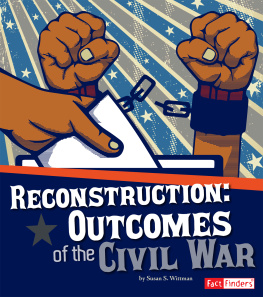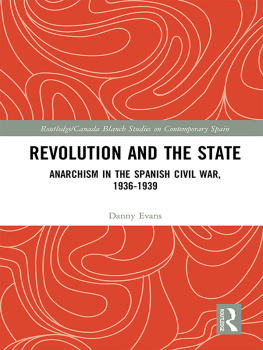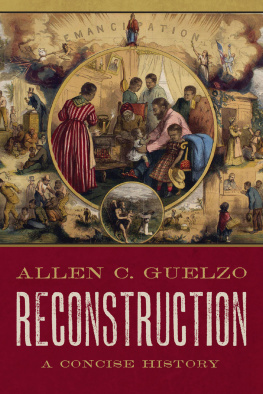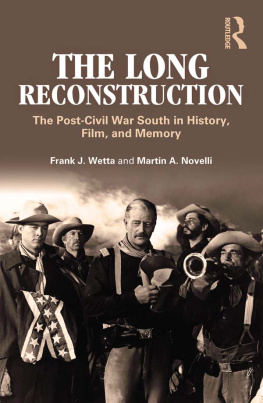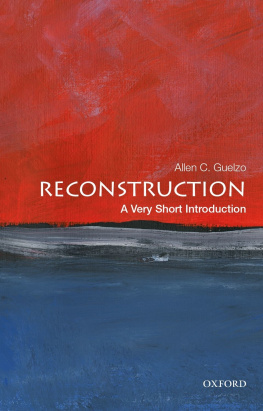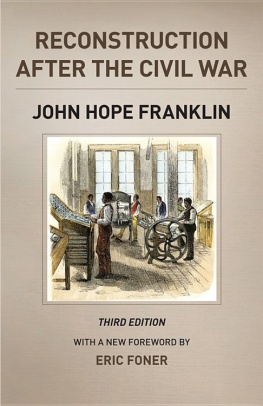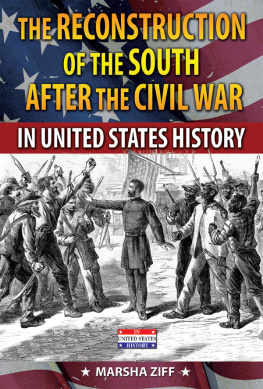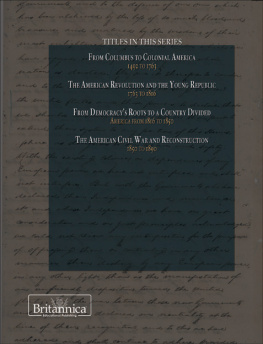2009 THE UNIVERSITY OF NORTH CAROLINA PRESS
All rights reserved
Designed by Kimberly Bryant Set in Minion
by Tseng Information Systems, Inc.
Manufactured in the United States of America
The paper in this book meets the guidelines for permanence and durability of the Committee on Production Guidelines for Book Longevity of the Council on Library Resources.
The University of North Carolina Press has been a member of the Green Press Initiative since 2003.
Library of Congress Cataloging-in-Publication Data
Summers, Mark W. (Mark Wahlgren), 1951
A dangerous stir : fear, paranoia, and the making
of reconstruction / Mark Wahlgren Summers. 1st ed.
p. cm. (Civil War America)
Includes bibliographical references and index.
ISBN 978-0-8078-3304-9 (cloth : alk. paper)
1. Reconstruction (U.S. history, 18651877) 2. Reconstruction (U.S. history, 18651877)Psychological aspects. 3. FearUnited StatesHistory19th century. 4. AnxietyUnited StatesHistory19th century. I. Gallagher, Gary W. II. Title.
E668.S93 2009
973.8dc22
2009009375
13 12 11 10 09 5 4 3 2 1
Illustrations
The Times
A Bad Egg
From Ye Book of Copperheads
The Civil Rights Scare Is Nearly Over
The Little Boy Would Persist in Handling Books above His Capacity. And This Was the Disastrous Result
Andrew Johnsons Reconstruction; and How it Works
To Union Men. The New Orleans Convention or Massacre, Which Is the More Illegal
King Andy I. How He Will Look and What He Will Do
Amphitheatrum Johnsonianum 1867
Ides Febrvarii, MDCCCLXVIII
The Political Death of the Bogus Caesar
Dignity and Impudence
Wilkes Booth the Second
Too Thin, Massa Grant
The Republic on the Brink,
A Threatened Military Execution
Constancy
Farewell, A Long Farewell, to All My Greatness,
Acknowledgments
Many friends have kept me company on my way over to the Dark Side. William F. Freehling, supportive and inspirational as always, provoked the paper by persuading me to talk about Reconstruction at a historical convention and later by encouraging me to apply historical methods to other peoples madness. Michael Fitzgerald, Joanne Melish, Tracy Campbell, David Hamilton, and Shearer Davis Bowman were loaded down with fears (three hundred pages worth) and wrestled them into lucidity and temperate language. The staff at the University of Kentuckys Interlibrary Loan strove to keep me supplied with microfilms innumerable of newspapers indispensable, and of course dozens of archives took the trouble to open their chambers of secrets. Generously, astutely, Gary Gallagher and Mitchell Snay corrected every mistake they could find, and the University of North Carolina Presss third reader provided reams of advice that I wasted no time in following. My special thanks to Dorothea Anderson, whose assiduous copyediting must have seemed daunting, especially figuring out the capping of radical. Any errors in that regard are, of course, mine. As always, my parents, Clyde and Evelyn Summers, were my first and last resort in trying out ideas and arguments. My excellent eldest daughter, Ariel, began by expressing fears wilder than any published herethe prospect of Palestinian terrorists invading and breaking into our car and poisoning the open bag of gingersnaps on the front seat being among the most remarkableand then, in the face of real misfortune, taught me much about mastering fears that proved after all to be real. It is because of her reminder of the power not just of fear but of hope that I dedicate this book to her.
A Dangerous Stir
Prologue
Empire Day?
The poets eye, in a fine frenzy rolling,
Doth glance from heaven to earth, from earth to heaven;
And as imagination bodies forth
The form of things unknown, the poets pen
Turns them to shapes, and gives to airy nothing
A local habitation and a name.
Such tricks hath strong imagination,
That, if it would but apprehend some joy,
It comprehends some bringer of that joy;
Or, in the night, imagining some fear,
How easy is a bush supposed a bear!
Shakespeare, A Midsummer Nights
Dream, act 5, scene 1, lines 1222
Early in the fall of 1866, an alarming event that would have put the republic itself in deadly peril did not happen. On October 11, a Washington reporter for the Philadelphia Public Ledger revealed a series of questions that President Andrew Johnson had posed to his attorney general. In effect, they came down to two: Was a Congress that lacked most of its southern membership legal? And did the president have a duty to seat a Congress that did pass constitutional muster?
The inference, easily drawn, was that the president was readying the legal cover for a coup dtat. Assuming that the Democrats picked up enough seats in the House that November to make a legal majority when combined with the excluded southern lawmakers, they might declare themselves the legal Congress. Republican congressmen would meet separately, claiming themselves as the only legitimate legislative branch. But Johnson would have the last word. Backed by the attorney generals opinion, he would send in the army to disperse the Republicans. Perhaps he would declare the Democratic Congress the one true body. Or perhaps he would declare that neither Congress had a better claim and that, till a new Congress met on March 4, 1867, with all the states represented, he and he alone was the government. Either way, a years worth of Reconstruction legislation would be torn to tattersand very likely the republic with it. Southerners, many splashed with treasons taint, would rule or
The tale was balderdash, of course. To our own ears, the plot it meant to cover sounds perfectly insane. But if so, quite a number of cool-headed Americans went momentarily mad. Corrections followed, but what should concern us most is how readily the original report found believers.
And how could Americans help believing it? In the vexed state of public opinion that autumn, imagined revolutionary plots had become the stock-in-trade of both political parties. By then, there was more than enough circumstantial evidence to lead the most fretful northerners into suspecting that Andrew Johnson might be readying a coup dtat as soon as the elections were over. Some Americans actually let their wish father the thought. They saw a menace every bit as dire that could be countered no other way: a Congress of bloodthirsty revolutionaries, legislating a republic into an empire.
Something particularly nasty was stirring beneath the usual mix of personalities, policy, and constitutional exegesis on which an election campaign usually ran. Perhaps we should heed it. The Ledgers one-day wonder never would have gotten past the editors without a broader climate of opinion to give it a backdrop. Reconstruction policythe postwar settlementwas shaped not simply from politics, principles, and prejudices, but also from fears, often unreasonable, phantasms of conspiracy, dreads and hopes of renewed civil war, and a widespread sense that four years of war had thrown the normal constitutional process dangerously out of kilterindeed, so dangerously that the republic itself lay in peril. At the very moment that historians have seen a new birth in Americas highest ideals, the idealists themselves saw too clearly some rough beast, its hour come round at last, slouching toward Washington to be born.


